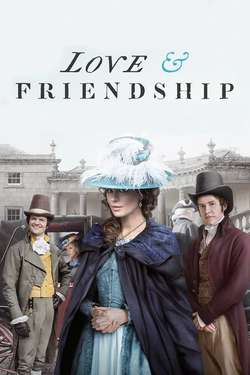
Love & Friendship
Directed by Whit Stillman
Starring Chloë Sevigny, Kate Beckinsale, Xavier Samuel, Stephen Fry and Emma Greenwell
From Jane Austen’s novella, the beautiful and cunning Lady Susan Vernon visits the estate of her in-laws to wait out colorful rumors of her dalliances and to find husbands for herself and her daughter. Two young men, handsome Reginald DeCourcy and wealthy Sir James Martin, severely complicate her plans.
See more films
Reviews
-

★★★★½ review by Melissa Tamminga on Letterboxd
Love & Friendship opened in Bellingham yesterday to a happy crowd of - wait for it - older women. Genuinely puzzled, my daughters, whom I had brought with me to the screening, commented on the sea of graying feminine heads. Jane Austen, so the perception goes, is just for the ladies.
I'm a fan of a number of Jane Austen adaptations, the Andrew Davies/Jennifer Ehle/Colin Firth Pride and Prejudice, of course, as well as the Emma Thompson/Ang Lee collaboration, Sense and Sensibility. But even these adaptations don't quite do Austen justice, for as far as I'm aware, every straight Austen adaptation up until now (let's leave loose adaptations like Clueless aside for the moment) have assumed that the love story is really the main point.
The Austen I know on the page, however, uses romance to explore and expose the folly at the heart of a social system and within the politics of gender. She exposes the folly in the human heart itself. For Austen is as shrewd a judge of human nature as Shakespeare or Dickens, and she’s a great deal more cynical than Dickens, who tends towards sentimentality, and more clear-eyed than Dickens, particularly about women, whom he tends to see as either shrews or angels. (Sidenote: I do love Dickens; let's just be clear about his tendencies.)
Love & Friendship is something new in the world of Austen adaptations: it gets the wit, satire, cynicism, humor, and incisive social commentary in the Austen canon. It's certainly possible that the centrality of the devious Lady Susan makes this story particularly suited to highlight Austen’s social satire, for Lady Susan is not exactly what we might call a romantic heroine.
Still, in the same way it would be a problem to call Much Ado About Nothing or As You Like It merely romances (for a lady-crowd) because they contain a romance plot, it is also a problem to assume that Jane Austen is a romance novelist whose adapted work will please only women.
Bless Whit Stillman.
-

★★★★½ review by SilentDawn on Letterboxd
83
What do you call someone who doesn't like this?
A bit of a rattle.
Whit Stillman's mastery falls in line with the confined structures and rooms of Austen's sharp, blistering snark, so it's only a matter of time before he tackled her work directly, settling into the plainly decadent hallways of Churchill and reveling in the quick wit of the tongue. So much delight in its airtight 93 minutes that it'll give you a contact high via the sheer extravagance of its mise en scène and the sly, sneaky women within it; a rearranging of a table controlled by buffoons.
-

★★★★★ review by Sean Gilman on Letterboxd
I’ll have more on this in a few days, I want to see it again. But as of right now, it’s easily the best film of 2016. Whit Stillman adapting Jane Austen works better than I imagined, seamlessly merging his comic rhythms into the Regency dialogue and story structure of her epistolary novella Lady Susan. The story is more acerbic than the Austen we know from BBC adaptations, which tend to emphasize the romantic melodrama of the novels over the stinging dialogue, the distance between what people in a highly regimented and ritualized society say and what they feel. The source material is unusual for Austen in this sense, privileging wit and style over romance or basic morality, but it’s perfectly in keeping with the spirit of The Last Days of Disco, the last film to pair Chloë Savigny and Kate Beckinsale. Stillman fleshes out the narrative around the edges (especially the character played by Tom Bennett, who steals the movie), but the sensibility is all Austen. It’s the film that proves that Austen is indeed the English language’s link between Shakespeare and Oscar Wilde, as Stillman is the heir to Ernst Lubistch and Ben Hecht.
-

★★★★★ review by Sean Gilman on Letterboxd
Went to see this at my local art house theatre and it was packed, maybe even sold out. The wife and I are not young by any means, but we were still the youngest people there by a good 20 years, but for two younger women who appeared to be accompanying their grandmothers. I was one of three or four men in the crowd.
Yet the film is a hit, the first Whit Stillman movie to make the top ten of the weekly box office. Imagine if some young people, or any men at all, bothered to go see what is the best film of the year so far?
-

★★★★ review by Sam Van Hallgren on Letterboxd
For its power to transport me from this current time and place like no other 2016 film, it will compete for a top spot on my year end list. Messes with the Austen/Wilde witty costume drama conventions just enough to keep things off kilter. And in every other way a delight from start to finish.
- See all reviews
